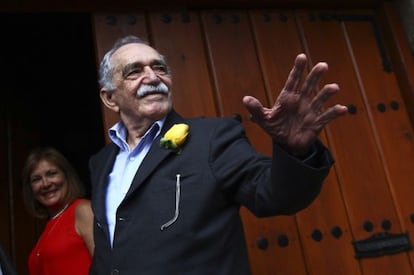The last days of García Márquez
The family of the Nobel Prize-winning author fiercely guarded his private life to the end

It was 12.08pm on Holy Thursday when the literary world lost Gabriel García Márquez. The official cause of his death was a heart attack, but the Nobel Prize-winning author had been in poor health for some time.
Just a week prior to his passing, García Márquez was admitted to a Mexico City hospital suffering from a lung infection. After his doctors treated him for bronchitis, they recommended that his family take him home and begin administering palliative care. During this period, a physician visited him three times a day. And when the moment came, he was surrounded by his wife, Mercedes Barcha, two sons, Gonzalo and Rodrigo, and five grandchildren.
Despite ongoing speculation about the real causes of his death, the family has chosen to remain silent. This was “Gabo,” a private man whose wishes no doubt are being respected by his widow; Gabriel García Márquez died at 87, and that is all that needs to be said.
He celebrated his last birthday on March 6 when he appeared in public for the final time. In 1999, the Colombian-born literary great was treated for cancer in Los Angeles where his son, Rodrigo, a filmmaker, lives. There was much speculation then; his memory also seemed to be failing him at times. Was it because he was suffering from Alzheimer’s or dementia? With the rumors circulating, his family went on with their lives. García Márquez continued to attend literary gatherings and weddings (he recently showed up at the inauguration of a bowling alley built by a friend), and accompanied Mercedes to music concerts and recitals.
García Márquez died, and that is all that needs to be said
And each year – as had been his custom since 2006 when he turned 80, and when he would begin to admit that he was forgetting things – García Márquez, with a yellow rose on his lapel, emerged from his Mexico City home on his birthday to celebrate with neighbors.
Throughout his later years, García Márquez – surrounded by admirers as well as gawkers – was always present in the most festive environments in both Cartagena, Colombia and Mexico City. He drew in others who may not have been familiar with his works and, as he had with his fans, won their affection, perhaps because of his Caribbean-style wit and humor. At times he would read his works aloud, as if he were trying to restructure them. And then he would ask someone nearby: “You think I was stoned when I wrote this?”, before bursting out laughing.
By this time, the frivolity of fame that came with One Hundred Years of Solitude was no longer important. As he once told his friend Plinio Apuleyo Mendoza in his work The Fragrance of Guava: “My life nearly fell to pieces […] the sense of reality seemed to bother me, perhaps just as much as having power; at the same time, your private life is constantly under threat. Tragically, no one realizes this until it happens to them.”
The frivolity of fame that came with ‘One Hundred Years of Solitude’ was no longer important
García Márquez sought refuge inside the biggest home he had ever owned, on 144 Calle Fuego in Mexico City’s San Ángel suburb. A few days before his death, a close family friend confirmed his frail health: “I don’t wish to survive him.”
Little by little, the illness and its effects, as well as the recurring memory lapses, helped prepare Gabo for his long farewell. He withdrew from the commitments he enjoyed most, such as writing and working with the organization he founded 20 years ago dedicated to Spanish-language journalism, the New Journalism Foundation; he retired on his own terms.
On Monday, thousands of Mexicans and Colombians will gather to say goodbye to one of the greatest writers of the 20th century in an unprecedented ceremony at Mexico City’s prestigious Palace of Fine Arts where two sitting presidents from two nations will pay their respects.
García Márquez once said: “The worst thing about death is that it is forever.” But his life and works remain immortal.
Tu suscripción se está usando en otro dispositivo
¿Quieres añadir otro usuario a tu suscripción?
Si continúas leyendo en este dispositivo, no se podrá leer en el otro.
FlechaTu suscripción se está usando en otro dispositivo y solo puedes acceder a EL PAÍS desde un dispositivo a la vez.
Si quieres compartir tu cuenta, cambia tu suscripción a la modalidad Premium, así podrás añadir otro usuario. Cada uno accederá con su propia cuenta de email, lo que os permitirá personalizar vuestra experiencia en EL PAÍS.
¿Tienes una suscripción de empresa? Accede aquí para contratar más cuentas.
En el caso de no saber quién está usando tu cuenta, te recomendamos cambiar tu contraseña aquí.
Si decides continuar compartiendo tu cuenta, este mensaje se mostrará en tu dispositivo y en el de la otra persona que está usando tu cuenta de forma indefinida, afectando a tu experiencia de lectura. Puedes consultar aquí los términos y condiciones de la suscripción digital.









































